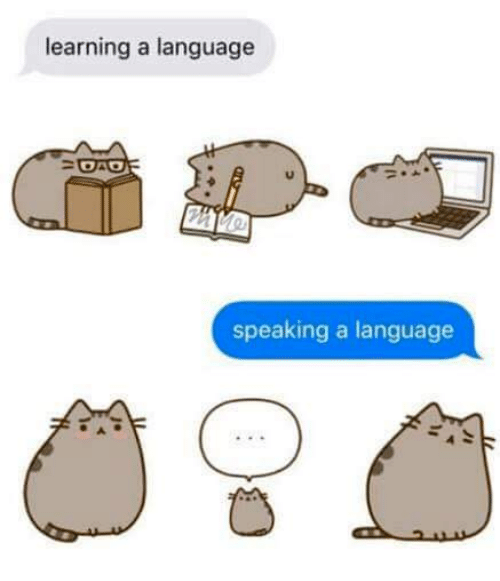This past week of Spanish has been the most arduous for me yet. We have less than a month to go in our 24-week program, by which time we must earn a 3/3 on the End of Training test (EOT) – with the numbers indicating levels of speaking and reading, respectively – in order to go to our foreign assignments. Our instructors and learning consultants are hitting us with so many assignments and activities at once it has made my head spin. The workload and intensity have jumped dramatically in the fourth and final phase. But the instructors aren’t torturing us to be mean. They want us all to make that steep climb to success in the short time remaining. And for that, we have to be constantly reading, talking extemporaneously, and stuffing ourselves full of as much español as humanly possible.
As I mentioned in my previous post, a couple of weeks ago all the Spanish students from my cohort underwent a formal pre-EOT to assess whether we were on track. We were all shooting for a 2+/2+. Fortunately, that’s what I got. And as far as I can tell, in the lead-up to the EOT, the Spanish students now fall into three loose categories.

Students who finished early. Yes, some of the students already earned their 3/3 (the score they need to go to Post) during their pre-EOT. Lucky them! They don’t have to test again, but they don’t get to stay home either. They will spend the next few weeks in an alumni class to maintain their language skills, since they’re still on the clock with other trainings or departure a few weeks out.
Students who are on track. Those of us who earned a 2+/2+ are working hard to boost up to a 3/3 with only a few weeks to go. We are doing this with various levels of calm and confidence, because we know we could very well miss the 3/3 mark and end up slapped with a 4-6 week extension in Spanish training.
In my case, that would be slightly awful from both an administrative and a reputational standpoint; I have back-to-back tradecraft trainings through April when we leave for México. They start – you guessed it – one business day after Spanish ends. And I really don’t want to delay my arrival at Post! My new colleagues and my predecessor are counting on me, and already putting things on my calendar. However, if this happens, it won’t be the end of the world. I just want to finish on time and keep things orderly.
Students who got put on notice. Whether they just had a rough pre-EOT performance, or whether they really are behind, students who earned less than a 2+/2+ are now either busting their bums to be ready, or resigning themselves to the extra training and not stressing too much. To me, the worst part is that their future bosses received an email notification that the student was behind and “at risk” of not passing the EOT. I understand that the purpose of these notifications is to keep posts from being blindsided by delayed arrivals and the staffing gaps they can cause. But still, what a brutal first introduction of your professionalism before you even get there!
I’ve said it before and I’ll say it again: the ability to learn a language is not a measure of intelligence. While I like and respect the Spanish Department administration and the whole learning team, there are challenges with this curriculum. Different learning styles, lack of prior exposure to Spanish, the lack of curriculum grammar focus, and the uneven experiences amongst students with regards to learning consultant support are all challenges. And some students are additionally disadvantaged by missing too much class due to illness or family emergency, or returning from high-threat posts with PTSD and struggling with concentration and retention.
I have no doubt the FSI Spanish curriculum has evolved over time in order to get students to what is essentially a professional level of fluency in less than six months. If we started with days of the week and colors, we would never get to where we are in such a short period. But that doesn’t mean that everyone will get there in 24 weeks, and I don’t think there is anything to be ashamed of about that.

I’ll leave you now with my sample day-in-the-life from this week:
04:30 – Alarm goes off, check to see where Australian fires have burned overnight, stagger to hit button on coffeemaker and sit down at desk in tiny apartment trying to be quiet. Read assigned articles – one about challenges mothers face in the labor market, another about the Holocaust, and a third about the death penalty. Define unknown words, jot down key points in case I am called on to present.
05:30 – Make a recording of myself talking about inequality, or labor unions, or trade agreements. Email it to instructor and learning consultant. Work through one rotation of my connector flashcards. Check the English news, social media, and work email and roll my eyes several times. Glance at the news in Spanish before dashing to the shower.
06:30 – Get ready for work, eat breakfast, pack a lunch. Forget my overdue FSI library books, again.
07:50 – Leave for FSI in my car even though there’s a free shuttle because I get carsick on the shuttle.
08:10 – Get to class, intending to warm up but instead shoot the breeze with my three classmates and talk in English about how tired we are.
08:30 – First hour of class, talk about news and discuss articles. There’s nowhere to hide; we sit around the table as if we were in a meeting and talk, talk, talk.
09:30 – Second hour of class, make impromptu presentations with 5 minutes prep time, do debates, grammar in context. Listening comprehension.
10:30 – Third hour of class, reading articles and summarizing gist and supporting details.
11:30 – Lunch break, thank you Lord. Avoid the cafeteria, eat my own food, try to knock out some personal admin or at least get some exercise with a winter walk around campus.
12:30 – Independent study – sometimes I use it to get a jumpstart on my homework, work in the language lab, check work email, or have a 1:1 meeting with my instructor or language consultant.
13:30 – Fourth hour of class, more presentations, more discussion and debate, maybe we get surprised and have to conduct an interview with a native speaker on a topic we weren’t expecting.
14:30 – Fifth hour of class, could be any number of exercises – but even something as simple as watching video clips, playing a game, or doing a vocabulary brainstorm is usually brutal because our brains are fried by then.
15:20 – Class dismissed, head home.
15:45 – Get home, have less than two hours home alone to get work done in silence, but am starving and brain is feeling muddled. Struggle to get the jump on it anyway.
The hours after this are usually filled with some combination of going to the gym, watching a movie, eating dinner, and going to bed. Less often my husband and I might go out, or I might meet friends or have a personal appointment. But this week, I went to bed by 17:00 twice. And then I wake up and try to do it all again! Although I have always been a night owl and would traditionally rather stay up late to finish something rather than get up early to finish something, lately I have been so tired that I reach a point where it isn’t productive to try and study more, leading to super-early wake-up times just to have enough time to finish all the assignments.

Hello, out of curiosity and as someone who enjoys learning languages, do you believe that the only way to become fluent is to use the language every day for a period of time (say 24 months, ha)?
LikeLiked by 1 person
I don’t know – I think people learn differently, but for the most part, sustained, intensive exposure and reliance on the language can add up quickly. Being immersed in a language and not using English or other languages forces you forward in the language you’re trying to learn. In my case, I don’t have a choice because we’re all on this 24 week deadline. I know that some people can use multiple languages at the same time without mixing them up, but for me, I have left Macedonian and Russian to the side for now so I can focus on Spanish and that’s helping. What kind of languages do you like to study?
LikeLike
Thanks for your reply! Well, Iearned Italian in college, but never became conversational until I made a new friend who only spoke it, and we spent enough time together that I my vocabulary and speaking ability grew rapidly. He needed a lot of help having moved here so we were in touch a lot. I have been learning French for several years but I feel as though I’ve hit a wall and won’t ever get any better since I don’t have anyone to speak to on a regular basis. And just started learning German. I guess learning languages in kind of a hobby for me, but I worry it’s not perhaps worth investing the time, as much as I enjoy it, if I’ll always hit the same wall. Do you feel like you lose the language once your assignment is over, or are you essentially fluent by the time you get to your post?
LikeLiked by 1 person
I think there are ways to overcome that wall/plateau, and get to the next level – a lot of higher level reading, accumulating more vocabulary, and talking with native speakers regularly. I sometimes get bored of the things I say and need to come up with different constructions. It just seems to be practice, essentially. I have mixed feelings about how the FSI language programs prepare us for work at our posts. In Russian, I arrived at Post able to discuss a ton of different issues, and with a good grammatical foundation, but literally no consular interview vocabulary or questions. I had to get all of those on the fly during my two weeks of observation before I started interviewing. I understand that Russian, like Spanish, now has a consular tradecraft component which is great. I haven’t kept my Russian up but I don’t feel it is gone – probably just dormant. My listening is still OK. With Spanish, I probably won’t really feel fluent until the end of my assignment in Mexico in 2022 or 2023!
LikeLike
That’s great advice thank you so much! Best of luck to you and thank you for serving our country. And the blog, I enjoy reading it and have learned a lot! It seems to be a very rewarding career but also has a lot of sacrifices.
LikeLiked by 1 person
I’m so fascinated by your journey! I’ve been learning languages for 6 years (Spanish, Portuguese, and now Italian) and I’ve been searching for a language course/outline that provides a similar learning style to what the FSI does for language learning. Do you happen to know of such a syllabus or course outline that goes over the different speaking/writing/debating topics?
LikeLiked by 1 person
I appreciate you reading the blog! Have you studied at FSI? In my opinion, FSI doesn’t have a standard curriculum across all its language departments. It does have a standard goal, though: teach to the end of training exam students must pass to go to post. It’s not always the most useful setup for “learning” per se, in my opinion. But I’ve found the curriculum and pacing to be largely to the individual departments and even to the individual instructors at times. It’s just my opinion – it may be out of date, because I studied Russian (2014-2015) and Spanish (2019-2020) a while ago now. I wish I could help more with your question, but I haven’t undergone independent language study in such a manner that I would be familiar with the best resources. FWIW, and you may have picked up on this, I thought the FSI Russian program was a lot stronger (and for me, oddly, easier) than FSI Spanish.
LikeLike